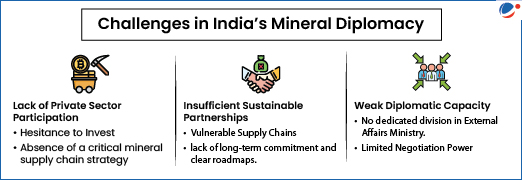India's technological growth is critically constrained by its dependence on imported critical minerals, with the Union Defence Minister recently warning about China’s strategic weaponization of these resources.
- China controls 60% of rare earth production, 60% of critical minerals production and 80% of the processing worldwide.
- Hence, to mitigate India’s strategic vulnerabilities and ensure mineral security, it has launched proactive efforts in mineral diplomacy.
Mineral Diplomacy: Refers to a country's efforts to secure critical minerals for economic and national security, aiming to reduce supply disruption risks and dependence on geopolitical competitors.
Pillars of India’s Mineral Diplomacy
- Establishing Joint Ventures
- KABIL’s (Khanij Bidesh India Ltd.) International Partnerships: Secured agreements with mineral-rich countries like Australia & Argentina; also, acquired strategic critical mineral assets in Bolivia and Chile.
- India-Central Asia Collaboration: India and Kazakhstan formed a joint venture to produce titanium slag.
- India also proposed an India-Central Asia Rare Earths Forum to tap region’s critical mineral resources.
- Ensuring Cooperative Engagements: By forging partnerships with minilateral and multilateral initiatives related to mineral security, such as:
- Quad (Australia, Japan, India, the United States), Indo-Pacific Economic Framework for Prosperity (IPEF), Mineral Security Partnership (MSP) and the G-7, for cooperation in the critical mineral supply chain.






